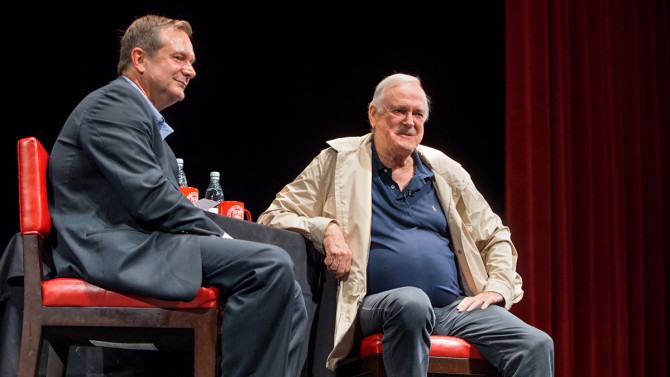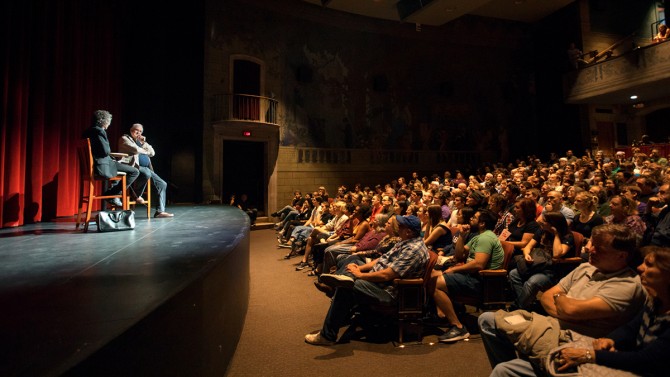Cleese offers insight to happiness: ‘modest aims, have cats’
By Blaine Friedlander
Provost’s Visiting Professor John Cleese covered a broad range of topics, from love to stupidity to money, in a public talk in Bailey Hall Sept. 11. His overarching theme: Always look on the bright side of life.
Cleese – British actor, writer, philosopher-barrister and Python – returned to Cornell for a week to visit classes, engage with students, awaken imaginations and, as he described, to “stir things up a bit.”
In the two-hour event, Dean J. Smith, director of Cornell University Press, peppered Cleese with a mixture of audience questions and his own. After discussions of greed and financial misery, Smith asked if Cleese could teach a course at Cornell, what would it be?
“Maybe I’d want to teach how to be happy,” the 78-year-old replied. “Something from psychology, because I don’t think there’s anything more interesting than the human mind. This is stuff that affects our lives.”
Cornell University Press will publish a selection of Cleese’s Cornell presentations; Monday’s event will become the book’s final chapter.
Appointed an A.D. White Professor-at-Large in 1999, Cleese savored his role on the Cornell faculty. He was so popular with students that the university extended his six-year term for an additional two years. Then, in 2006 he was appointed a Provost’s Visiting Professor and engaged with students on the Ithaca and Weill Cornell Medicine campuses.
Cleese recalled his first arrival on campus. “I remember being very impressed talking to students everywhere. They had real pride in being at Cornell,” but they grumbled about the academic demands, he said. Cleese told the professors that students think they work too hard. The professors told the actor: They do.
“I thought this was very odd,” Cleese said. “If they think you’re working them too hard and you think they’re working too hard, aren’t we coming toward some sort of plan?” The Bailey audience laughed appreciably.
“I don’t think we know – in America – how to live very well. There’s such an emphasis on acquisition,” he said.
Cleese told stories of impoverished Sarajevo and South America, where people are happy. “Happiness is a jolly good aim,” he said. “Everybody here thinks they want to be happy, but they don’t know how to go about it because the culture is sending the wrong signals.”
Smith read a question, “What’s the secret to happiness?”
Without missing a beat, Cleese replied: “It’s about having modest aims. The most important thing about life … is do something, a job you find interesting. Keep your aims, your targets achievable. All that stuff about billionaires and money, they’re a miserable lot.
“The second thing is: Don’t have children. Children cause most of the misery in the world. Avoid children – instead, have cats,” he said, as the Bailey crowd roared. “Cats are fantastic. They’re absolutely wonderful. They’re affectionate when they feel like it … and when they grow up, they don’t blame you for everything.”
Media Contact
Get Cornell news delivered right to your inbox.
Subscribe
